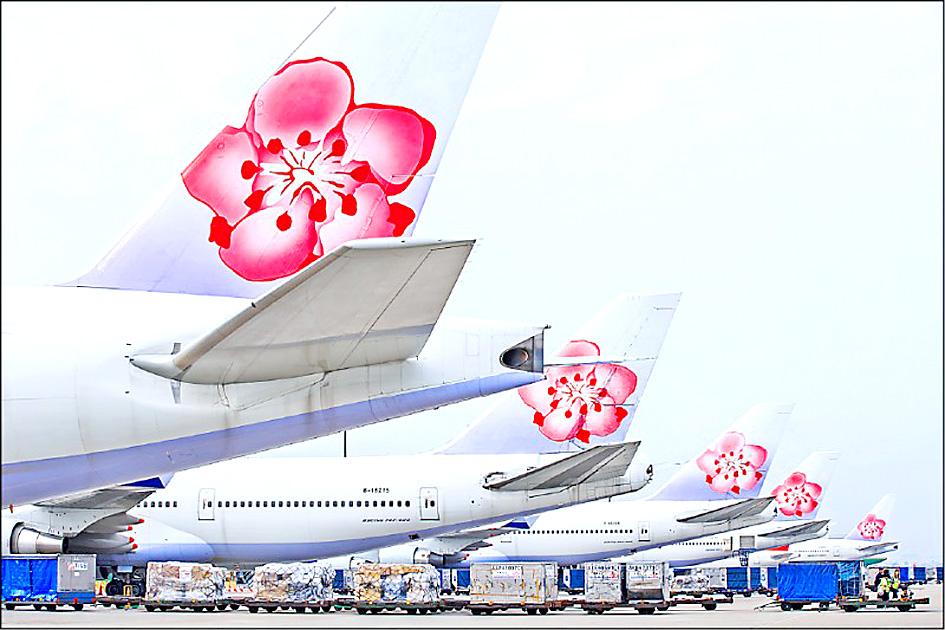China Airlines Ltd (CAL, 中華航空) is to increase its free baggage allowance by 10kg for passengers flying to Europe, Australia or New Zealand, while lowering its fee for luggage exceeding the free weight limit, it said yesterday.
The move is the airline’s latest effort to attract passengers, after local rival EVA Airways Corp (長榮航空) late last month announced that from Thursday it would increase its free baggage weight allowance for all passengers.
For economy-class passengers who fly to destinations other than the US and Canada, CAL currently has three weight limits for free baggage based on the airfare — 20kg for “discount” tickets, 30kg for “basic” and “standard” fares, and 35kg for “flex” fare, its Web site showed.

Photo courtesy of China Airlines Ltd
Each fare offers different services, such as seat selection or the ability to change a flight without charge, the company said.
The weight limits have been increased by 10kg starting from yesterday, it said.
Under the change, economy-class passengers can check 45kg of baggage for free if they buy tickets under the “flex” fare category, it said.
EVA is to offer a maximum baggage allowance of 46kg for economy-class passengers, but requests that they check only two pieces of luggage not exceeding 23kg each.
CAL is also to lower its fee for luggage that exceeds the free weight limit for passengers flying to Asian destinations from US$15 per kilogram to US$8 per kilogram, and reduce the charge for passengers flying to Europe, Australia and New Zealand from US$45 per kilogram and US$30 per kilogram respectively to US$10 per kilogram, it said.
The airline reported that passenger revenue grew 231 percent year-on-year to NT$489 million (US$16.45 million) last month, its highest passenger revenue in a single month this year, thanks to a significant growth in passenger numbers and higher ticket prices.
For the first five months of the year, the airline’s passenger revenue expanded 37 percent to NT$2.36 billion, which is still dwarfed by its cargo revenue of NT$128 billion during the same period, company data showed.

Zhang Yazhou was sitting in the passenger seat of her Tesla Model 3 when she said she heard her father’s panicked voice: The brakes do not work. Approaching a red light, her father swerved around two cars before plowing into a sport utility vehicle and a sedan, and crashing into a large concrete barrier. Stunned, Zhang gazed at the deflating airbag in front of her. She could never have imagined what was to come: Tesla Inc sued her for defamation for complaining publicly about the vehicles brakes — and won. A Chinese court ordered Zhang to pay more than US$23,000 in

Taiwan Semiconductor Manufacturing Co (TSMC, 台積電) yesterday said that its investment plan in Arizona is going according to schedule, following a local media report claiming that the company is planning to break ground on its third wafer fab in the US in June. In a statement, TSMC said it does not comment on market speculation, but that its investments in Arizona are proceeding well. TSMC is investing more than US$65 billion in Arizona to build three advanced wafer fabs. The first one has started production using the 4-nanometer (nm) process, while the second one would start mass production using the

A TAIWAN DEAL: TSMC is in early talks to fully operate Intel’s US semiconductor factories in a deal first raised by Trump officials, but Intel’s interest is uncertain Broadcom Inc has had informal talks with its advisers about making a bid for Intel Corp’s chip-design and marketing business, the Wall Street Journal reported, citing people familiar with the matter. Nothing has been submitted to Intel and Broadcom could decide not to pursue a deal, according to the Journal. Bloomberg News earlier reported that Taiwan Semiconductor Manufacturing Co (TSMC, 台積電) is in early talks for a controlling stake in Intel’s factories at the request of officials at US President Donald Trump’s administration, as the president looks to boost US manufacturing and maintain the country’s leadership in critical technologies. Trump officials raised the

From George Clooney to LeBron James, celebrities in the US have cashed in on tequila’s soaring popularity, but in Mexico, producers of the agave plant used to make the country’s most famous liquor are nursing a nasty hangover. Instead of bringing a long period of prosperity for farmers of the spiky succulent, the tequila boom has created a supply glut that sent agave prices slumping. Mexican tequila exports surged from 224 million liters in 2018 to a record 402 million last year, according to the Tequila Regulatory Council, which oversees qualification for the internationally recognized denomination of origin label. The US, Germany, Spain,